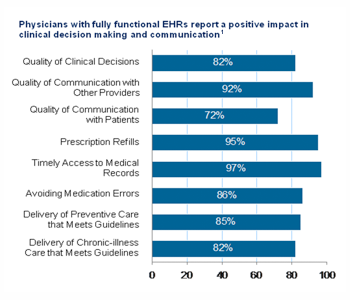Medicine is an information-rich enterprise. A greater and more seamless flow of information, aided by electronic health records (EHRs) (sometimes referred to as electronic medical records), can transform health care by organizing it around the patient. With EHRs, a patient’s information is available whenever and wherever it is needed.
The Health Information Technology for Economic and Clinical Health (HITECH) Act, a component of the American Recovery and Reinvestment Act of 2009, represents the Nation’s first substantial commitment of Federal resources to support the widespread adoption of EHRs.
Better Decisions and More Coordinated Care with EHRs
With more complete patient information, providers improve their ability to make well-informed treatment decisions quickly and safely.
 1 Chaudhry B, et al. (2006). "Systematic Review: Impact of Health Information Technology on Quality, Efficiency, and Costs of Medical Care." Annals of Internal Medicine.
1 Chaudhry B, et al. (2006). "Systematic Review: Impact of Health Information Technology on Quality, Efficiency, and Costs of Medical Care." Annals of Internal Medicine.Moving Beyond the Paper Record
By making it easier to use and share information, EHRs can help health care providers do a better job of managing patient care.
When fully functional and exchangeable, the benefits of EHRs offer far more than a paper record can. EHRs can:
Profiles in Health IT

Dr. Jennifer Brull, M.D. Prairie Star Family Practice, Plainville, KS
"I am able to find cancer earlier using EHRs."
More about Dr. Brull







